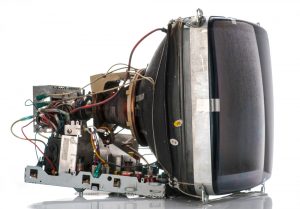
Recycletronics, an electronics recycling company based in Sioux City, Iowa, was forced to stop accepting CRT devices Jan. 17. The Iowa Department of Natural Resources (DNR) said it wouldn’t renew the company’s CRT permit until the business complies with state and federal regulations, according to the Sioux City Journal.
The U.S. Environmental Protection Agency (EPA), meanwhile, executed search warrants last week at the company’s current location in Sioux City and a separate former location in nearby South Sioux City, Neb. and has now referred the case to the U.S. Attorney’s Office. The company’s owner, Aaron Rochester, told the Sioux City Journal authorities seized documents and copied information from computer hard drives.
Rochester, a former member of City Council in Sioux City and current member of the city’s environmental advisory board, told the Sioux City Journal last week that he has provided all the information the EPA asked for and hopes the permit problem will be resolved within a few weeks.
Rochester also told the paper the business is not closed down and that he is “actively trying to just work on our stockpile.”
In documents from regulators, it’s unclear how much glass the company has on hand and where exactly the glass exists — the company has had operations in three locations over the past few years, including two in Iowa and one in Nebraska. The company has been evicted from one of the Iowa locations and the Nebraska location.
EPA officials sent Recycletronics a “warning letter” in December requesting more information about the status of each company location, how the company processes CRT glass and where it is being stored.
Regulators take interest
Documents provided to E-Scrap News by the Nebraska Department of Environmental Quality (DEQ) indicate Recycletronics sent processed CRT glass downstream to Phoenix-based Closed Loop Refining and Recovery, as well as Technologies Displays America in Calexico, Calif.
Closed Loop shuttered in 2016, leaving tens of millions of pounds of leaded CRT glass at sites in Arizona and Ohio.
The documents, which include memos and emails from the three environmental agencies involved in the case, also reveal that the recent license suspension and government investigation follow a long period of regulators taking interest in Recycletronics’ activities.
During 2015 and 2016 inspections of the company’s former Iowa location, EPA officials identified electronics stored outdoors in overflowing containers that were “open, in poor condition and not weatherproofed.”
Leaded CRT glass was usually processed and sent to a downstream outlet for recycling within a month of being received, a company representative told the EPA during a 2015 inspection.
The EPA documents show surges of incoming material prior to a 2015 inspection at a former Recycletronics facility in Iowa caused the company to begin storing excess materials in an outside storage area behind the warehouse. At the time of the inspection, CRTs filled roughly 100 gaylords, each holding one cubic yard. The EPA cited the company for “failing to minimize the possibility of release” of hazardous material at that location in the warning letter sent to Recycletronics in December 2016.
Property evictions
In fall 2015, the company was evicted from its former Iowa location. At some point, the company began storing CRT glass at a separate facility with a different owner in South Sioux City, Neb., although CRT glass remained at the Iowa facility despite the eviction.
The Nebraska DEQ visited the South Sioux City site in October 2015 and January 2016 and observed crushed CRT glass piles outside. The material had come from the company’s Iowa processing plant.
The owner of the Nebraska property sued Rochester in January 2016, according to the Sioux City Journal. The suit claims Recycletronics had breached its lease and was using more property for CRT glass storage than its lease allowed for. The Nebraska lease was terminated, but the suit alleged the CRT piles remained.
Rochester told the Sioux City Journal the glass at the Nebraska site was supposed to be used for another company’s business venture, which did not materialize.
The company now operates out of a new location in Sioux City.
Calls and an email inquiry to Recycletronics went unanswered. An EPA representative declined to comment to E-Scrap News, referring inquiries to the U.S. Attorney’s Office in Sioux City. That office did not respond to a request for comment.